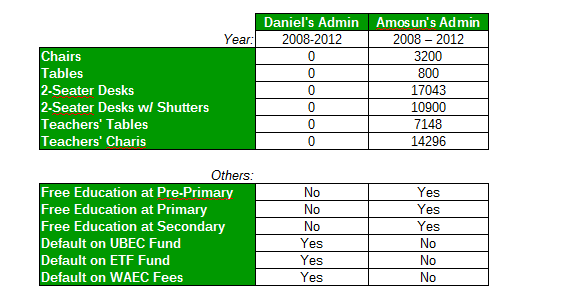OGUN, Nigeria – “I used to pay school fees and buy textbooks for all my children from the primary school to tertiary level. When Amosun came and talked about free education, I was a bit sceptical. But when my daughters in the primary and secondary schools did not pay school fees throughout the last session (2011/12) and returned home with writing materials and textbooks, I was so happy. I have also not paid school fees for my boy in the nursery school in the last one year. Now, I only pay for my daughter in Ojere (MAPOLY). I am very grateful for this financial relief by the Amosun administration.”
THAT was the voice of a chauffeur at the workshop of an auto-mechanic in the fall of 2012. I was only drawn into the chit-chat when the man mentioned nursery school. I thought there was a mix-up somewhere. Was there a charity organisation running free nursery school? Up till that time, I must confess, I did not know that many government’s primary schools also had nursery schools. Upon inquiries, I discovered that our free education also covered that level of education.
Garrulity, admittedly, may be a vice, but taciturnity is not always a virtue. If you don’t blow your own trumpet, nobody will blow it for you. In a country like Nigeria, where politics is still seen by some as a zero-sum game, you need to constantly tell your own story, otherwise the lies being spewed by the opposition may one day be accorded some undeserved attention by the unwary.
Before Amosun was sworn in as governor of Ogun State on May 29, 2011, there was no free education at the pre-primary, primary, secondary and tertiary levels of public education. Parents were paying for everything and buying everything. Today, to the glory of the Almighty and through responsible governance and prudent husbandry of the resources of Ogun State by the governor, education is free at the pre-primary level, primary level and in secondary schools. Education at the tertiary level is heavily subsidized by the current government; it is not free.
When you consider the fact that an average family in Ogun State has children at the four levels of education at the same time, then you can appreciate the huge financial burden that has been lifted off the shoulders of these parents by the Amosun administration. This is a landmark achievement our government should celebrate.
Between 2007 and 2011, Ogun State defaulted in the payment of counterpart fund for UBEC, hence no money could be accessed under the UBE Act; parents paid for everything. The state also defaulted in managing the ETF in 2009, hence was unable to access the intervention fund in 2010. In parenthesis, I recall that Ogun was denied the MDGs funds for the years 2009 and 2010 because it mismanaged the N1.64 billion for the year 2008. When you consider the above and the fact that education was not free at any level, then you can appreciate the value the Daniel administration placed on education in Ogun State.
Today, the Amosun administration has offset all the outstanding counterpart funds and has not defaulted once. When you see structures in our primary schools with the inscription, ‘SUBEB 2008/2009’, it does not mean they were built under the last administration. Indeed, they were built under the Amosun administration, having paid the state’s counterpart funds for those years.
At the JSS level under the Daniel administration, the highest enrolment figure was 174,820. Today, through the free education policy of the Amosun government, enrolment figure has shot up to 214,837. The figure has increased from 146,737 to 162,536 at SSS level. Due to improvement in our technical education, some children now move from JSS to such schools while the majority proceed to SSS, which is a big plus for our drive in vocational/technical education. Expectedly, performance of our children in WASSSE has increased tremendously.
In a space of 4 years (2007 – 2011), for example, the last government did not provide a single chair or table for pupils and teachers at the pre-primary school. But under the current government, our children in the nursery schools have been provided with 3,200 chairs, 800 tables, 17,043 two-seater desks and 10,900 two-seater desks with shutters. 7,148 tables and 14,296 chairs have also been provided for their teachers.
Under the Daniel administration, pupils were paying for all manner of things such as file jacket, ID card, school prospectus, students dossier, examination fee, school inter-house sports, etc., which the Amosun government abolished.
At the inauguration of our free education in the fall of 2011, a question arose on whether the token PTA fees should even be allowed in public schools. The governor said it should be abolished. There was an argument that it was voluntary. The issue came up later during a courtesy visit by the state’s chapter of PTA, where the body said the token was a voluntary donation on the part of the parents. The governor accepted but with a caveat: no child must be sent home on account of PTA fees. And just how much is involved here? Between N300 and N900, which cannot buy a single textbook. Yet, depending on the class of the pupils, under our free education policy, they get a minimum of 7 textbooks and maximum of 12.

If you have ever been a teacher in a public school, then you will appreciate what it means for every student in your class to have textbooks. The practice before the declaration of free education by the Amosun administration was for the class teacher to have each of these textbooks and write on the blackboard. Most often, the textbooks were creased and torn as a result of long usage. In a class of about 70 pupils, not more than two pupils would have one or two textbooks because of the heavy financial burden on the peasant parents.
The previous government promised to pay the WAEC fees of SSS3 candidates but it reneged. According to the Commissioner for Education, Barr. Segun Odubela, the examination body wrote the new government, threatening to withhold the results of the children because of default by the last government. Not only that, running cost of the schools and subventions to our tertiary institutions were not paid. Virtually all the school buildings were dilapidated. Teachers’ salaries and allowances were not paid for many months – not only in the education sector. In short, rot was the word. In one tertiary institution, there was no convocation ceremony for eight solid years. To compound the infamy, the then government announced 100% increase in tuition fees in all its tertiary colleges.
The Amosun administration not only offset the inherited WAEC fees, it restored payment of running cost and subventions. The backlog of salaries has been substantially cleared. For instance, the governor spent one billion naira (N1bn) to offset the CONTISS and Monetization allowances of the staff of Olabisi Onabanjo University (OOU), which he inherited from the immediate past government. Imagine how many modern classrooms or lecture halls that could have been built by that amount! He also paid the arrears of three-month salaries owed lecturers of the institution by the former government.










